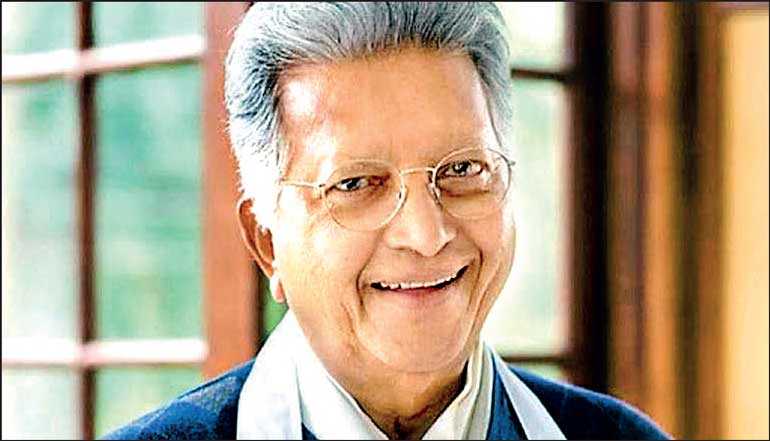Thursday Feb 26, 2026
Thursday Feb 26, 2026
Wednesday, 30 December 2020 00:00 - - {{hitsCtrl.values.hits}}

Dilmah Founder Merrill J. Fernando
Dilmah Founder Merrill J. Fernando has spent a lifetime dedicated to tea and helping others. In this interview he talks of his business philosophy, what CSR really means and what he wants to leave behind as his legacy for his employees and his children. Fernando was born on 6 May 1930, in the Negombo neighbourhood of Pallansena. Fernando strongly believes in the philosophy of seeing business as a matter of human service. He was awarded an Honorary Doctor of Science from Massey University, New Zealand, in recognition of his strong leadership in ethical business within the food and beverage industry. Fernando says every Government tends to rely too much on advice from their supporters instead of doing what every ministry should – engage two or three good, well-experienced businessmen to advice the ministry, then the Government activities will be far more productive. Following are excerpts of an interview:
By Dinesh Weerakkody
Q: The term philanthropy comes from ancient Greece and literally means ‘love for humankind’. In the past, this practice was narrowed down to big donations. Those had the primary goal of showcasing the donor’s good heart and sensitiveness. Over time, the concept broadened to include corporate social initiatives, growing from a donation-based notion to a richer and deeper framework. How do you see corporate philanthropy?
Corporate philanthropy is expressed in terms of money. Companies contribute to approved charities to take advantage of tax benefits. How those funds are used is generally not revealed because there is no link between the charity and donors. Executives discharge their obligations by making contributions but do not follow up on how the funds are spent.
Such charities, living on donations, spend around 45-50% on administration. Staff do not have any serious commitment to their work and the cause. Today, when shareholders demand 10-15% increase in dividends year after year, CSR gets second place. There must be board resolutions specifying a percentage of profits allocated to charitable activity. Such projects should be audited annually.
The best form of charity, which should attract tax benefits is, for companies to undertake their own projects. For example, a large company or two or three companies combined, may undertake the management of Government-owned homes for elders, orphanages, homes for disabled children, etc., etc., company staff and their families can play a role by visiting such places regularly. In doing so, they become aware of the need to help the poor.
Q: A desire to do good is an important first step. Following up with clear, corporate policies regarding social issues and programs to actively ensure that your company’s good intentions are translated into effective actions is no easy task. How do you do it as a company?
The MJF Charitable Foundation started when I commenced my own business in 1962. I contributed towards the welfare of my staff and their families, education and general welfare. I contribute 10% of profit before tax from all companies of the MJF Group. Projects funded were enormously successful and productive. From September 2020, the contribution was increased to 15% of profits before tax. The total contribution is in excess of Rs. 600 million annually.
We operate MJF Centres in different parts of the country. The main centre is at Moratuwa on a 12-acre plot of land, another is on a 23-acre plot of land in the Eastern Province, located in Kalkudah. Staff allocation is now in excess of 150 persons. I am totally committed to charity. As the Bible says, helping the poor is lending to God. God repays you in abundance. I bear testimony to this.
Q: Why is corporate philanthropy different from CSR?
If you spearhead a campaign to generate real CSR and work towards obtaining tax benefits, it will become a great service to the poor. Others will replicate activity and bring recognition to the country. All previous governments, present Government included, rely on long-term supporters and well-wishers for their advice and guidance which is the only way government rewards its friends and benefactors. As a result, proper, meaningful advice and guidance is not forthcoming. If every ministry engages two or three good, well-experienced businessmen to advice the ministry, the Government activities will be very productive.
Q: Poverty alleviation must also be a priority?
Elimination and reduction of poverty must be met by spreading private sector activities, such as garment factories, should be spread throughout the country. Direct base for spices, fruits and vegetables should be spread widely depending on suitability of such crop.
Q: Post-pandemic recovery; where and how do we start?
Recovery of the economy must be speeded up by avoiding ad hoc decisions but consulting each segment of the industry prior to introduction of restrictions. When such restrictions are changed from time to time, there is loss of confidence among those in production as well as customers in the case of exports. Most governments act first then review later. If they learn to consult the trade and others affected, changes and modification will not be required. My view is that, given necessary support in incentives, export sectors – tea, rubber, coconut, spices, will recover first. Most of these products are under-priced because there is no expertise and first-hand knowledge among those appointed to give proper advice. The slowest recovery will be export and sale of luxury goods.
Q: What do we need to do to build a world-class education system?
Our education system should be revised. From kindergarten, children must learn to love and respect our country, treat each other as Sri Lankans not as Buddhists, Christians, Hindus, Muslims, etc. Race and religion should remain in the hearts of children and not to identify one another.